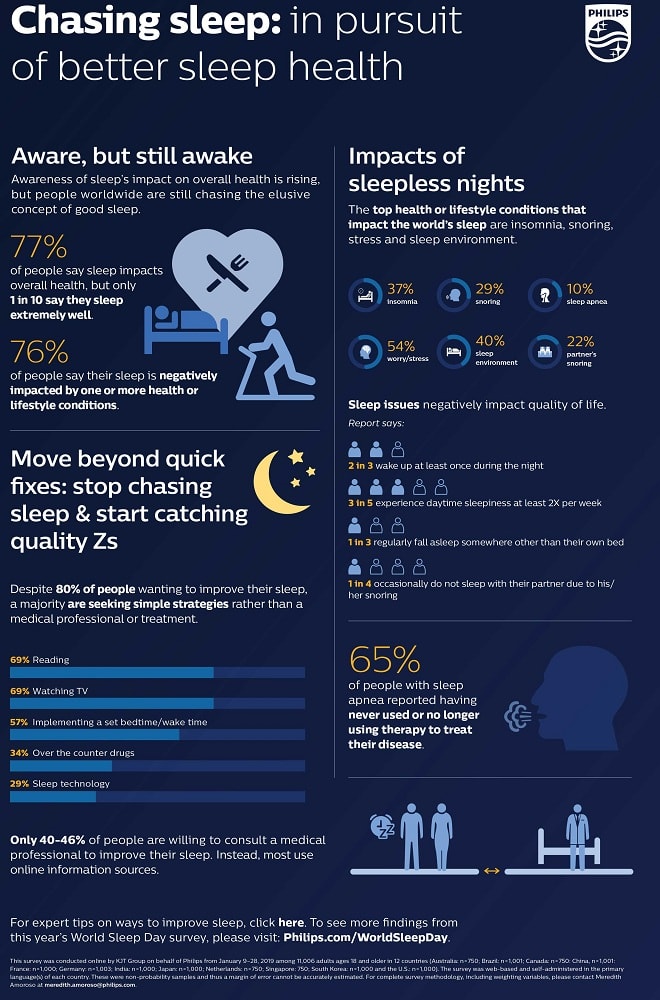Royal Philips a global leader in health technology, announced the findings from its annual global sleep survey in a report, “The Global Pursuit of Better Sleep Health”. The survey, executed each year in recognition of World Sleep Day (March 15), surveyed adults in 12 countries to capture attitudes, perceptions, and behaviors around sleep. Results showed that while awareness of sleep’s impact on overall health is on the rise, for many across the globe, achieving quality sleep health remains elusive.
Despite 77% of surveyed adults recognizing that sleep has an impact on health, 62% admitted they sleep only somewhat well and 44% stated that their sleep has worsened in the past five years. According to the Centers for Disease Control and Prevention, about 70 million Americans suffer from chronic sleep problems1 and poor sleep health resulting in sleep deprivation, which has a high correlation to depression, obesity, diabetes, heart disease, stroke, neurocognitive disease, and even cancer2.
The survey, executed by KJT Group on behalf of Philips, interviewed 11,006 respondents in Australia, Brazil, Canada, China, France, Germany, India, Japan, Netherlands, Singapore, South Korea, and the United States. The findings showed that most respondents would rather consult the Internet than a physician when it comes to sleep-related issues. Eight in 10 global adults want to improve the quality of their sleep, but the majority (60%) have not sought help from a medical professional. When struggling with sleep issues, those surveyed said they’re also most likely to turn to online information sources for their sleep concerns. Even more concerning, 65% of those who reported having sleep apnea have either never used or are no longer using sleep apnea therapy to treat their disease.
 “This data suggests that while people are waking up to the reality that sleep is fundamentally important, for most people, achieving quality sleep is still out of reach,” said Mark Aloia, PhD, Global Lead for Behavior Change, Sleep & Respiratory Care at Philips. “If we want to take sleep seriously and address the social and emotional aspects of poor sleep, we must begin to demonstrate that we can address these problems in both easy and meaningful ways that are supported by strong clinical science. Part of what we’re working towards at Philips is evolving our offering of clinically-validated solutions with a hope of addressing 80% of sleep issues across the globe in the near future. The hope is that people who have struggled with varieties of sleep issues for so long will have options available to them to sleep and live better.”
“This data suggests that while people are waking up to the reality that sleep is fundamentally important, for most people, achieving quality sleep is still out of reach,” said Mark Aloia, PhD, Global Lead for Behavior Change, Sleep & Respiratory Care at Philips. “If we want to take sleep seriously and address the social and emotional aspects of poor sleep, we must begin to demonstrate that we can address these problems in both easy and meaningful ways that are supported by strong clinical science. Part of what we’re working towards at Philips is evolving our offering of clinically-validated solutions with a hope of addressing 80% of sleep issues across the globe in the near future. The hope is that people who have struggled with varieties of sleep issues for so long will have options available to them to sleep and live better.”
The survey also found that 76% of adults surveyed globally experience at least one listed condition that impacts their sleep, with insomnia (37%) and snoring (29%) being the most common, an increase from the 2018 survey which showed 26% reporting insomnia, and 21% reporting snoring, respectively. With so many potential factors impacting a good night’s rest, Philips aims to use this data to help people across the globe understand not only the value of sleep, but how to start improving their sleep habits.
For more insight from this year’s survey, please visit this page. To view additional findings from this year or last year’s global survey, visit: Philips.com/WorldSleepDay.
Philips is deeply rooted in its commitment to developing clinically-proven solutions that help people take control of their sleep health. Philips aims to provide solutions that meet the growing and evolving needs of consumers and healthcare professionals alike, most recently with its expansion of the SmartSleep suite of solutions and its surpassing of ten million DreamWear masks and cushions sold worldwide. For more information on Philips’ advanced solutions for sleep and respiratory care visit www.Philips.com/SmartSleep
[1] https://www.cdc.gov/sleep/about_us.html
[2] https://www.ncbi.nlm.nih.gov/books/NBK19961/

















